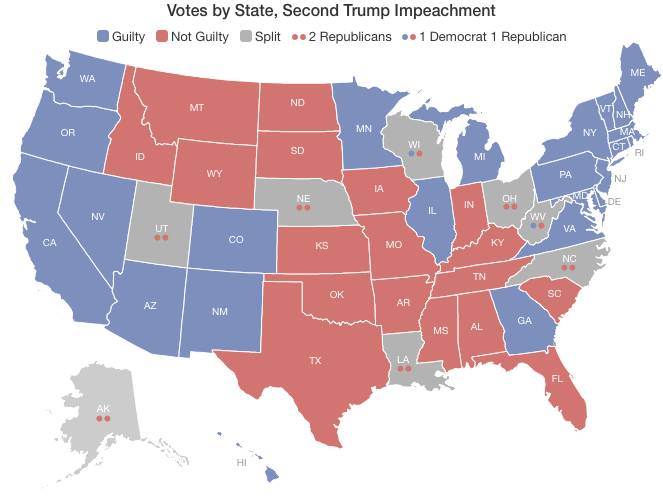Impeachment’s Fatal Flaw

As I write this, it’s February 13th, 2021. It’s °4 F and snowing lightly here in Denver. The Senate has just found Trump not guilty of Incitement of Insurrection, the single charge put forward in his second impeachment.
The final tally was 57 guilty to 43 not guilty. All 50 Democrats voted for impeachment. They were joined by Republicans Richard Burr from North Carolina, Bill Cassidy from Louisiana, Susan Collins from Maine, Lisa Murkowski from Alaska, Mitt Romney from Utah, Ben Sasse from Nebraska and Pat Toomey from Pennsylvania. Impeachment requires two-thirds of the members, or 67 votes with all 100 present.
I have feelings about this, that I’ll detail in a future post, but this is the most bipartisan impeachment vote in history.
The Fatal Flaw
There are only seven people in history who have voted to impeach a President from their own party: the seven who voted to convict Trump in his second impeachment. Mitt Romney was previously the only Senator ever to do so.
The fatal flaw in impeachment is the idea of an impartial jury. A jury made-up of Senators, half from from the President’s own party. There is no impartiality. There isn’t even the pretense.
The Oath is a Sham
The Senators take an oath before the trial. The Constitution says “When sitting for that Purpose, they shall be on Oath or Affirmation.” Since 1798, some variation of “I will do impartial justice according to the Constitution and laws: so help me God,” has been used.
Before Trump’s first impeachment, numerous Republicans including Senate Majority leader, and Yertle the Turtle impersonator, Mitch McConnell said, “I’m not an impartial juror. This is a political process. There’s not anything judicial about it.”
During the second impeachment, Republican Senators Lindsey Graham, Mike Lee, and Ted Cruz met privately with Trump’s defense team, both before and during the trial. Senator Rand Paul could also be seen talking to the defense during the trial.
So, that’s what practically counts as impartial justice. Mmmmmm. Swampy.
Who’s on the Jury?
The January 6 Insurrection was driven by the “big lie” that Trump won the election. Trump repeated this ad nauseum between the election and the coup attempt. This lie was also spread by numerous GOP Senators.
On January 6th, after the violence, there were objections to counting the electoral college votes of both Arizona and Pennsylvania. (The intial objection to Arizona took place during the attack, but both Senate votes below took place after they reconvened.)
-
Objecting to Arizona’s vote were Ted Cruz (R-TX), Josh Hawley (R-MO), John Kennedy (R-LA), Cindy Hyde-Smith (R-MS), and Roger Marshall (R-KS).
-
Objecting to Pennsylvania’s vote were Senators Ted Cruz (R-TX), Josh Hawley (R-MO), Cindy Hyde-Smith (R-MS), Cynthia Lummis (R-WY), Rick Scott (R-FL), Roger Marshall (R-KS), and Tommy Tuberville (R-AL).
Altogether, eight Republican Senators voted in objection. Should they have been allowed to sit on the jury? If they were excluded, only 61 votes would have been needed to convict.
If Lindsey Graham (R-SC) and Mike Lee (R-UT) were excluded for meeting with the defense team prior to the trial, in violation of their oath, only 90 Senators would remain on the jury, with just 60 needed to convict. Maybe three other GOP Senators would have voted to convict, if this were the case. And maybe rainbows will fly out of my butt.
A Fix
Rather than having the whole Senate vote, which reduces impeachment to a party-line vote, the Senators could nominate six Republicans and six Democrats to sit as the jury. If the vote were taken in secret and still required a two-thirds majority, impartial justice might be done.
But this would require a constitutional amendment, which requires a two-thirds supermajority vote in both the House and the Senate. Put some monkeys on the rainbows.
So far, Impeachment is 0–4
Like the Minnesota Vikings in the Super Bowl, impeachment has a perfectly imperfect record, four attempts, zero convictions, but let’s look at the votes.
-
In the first Trump impeachment, Mitt Romney voted guilty on one of the articles of impeachment, abuse of power. The votes were 48 guilty to 52 not guilty on abuse of power, and 47 to 53 on obstruction of congress.
-
When Bill Clinton was impeached he also faced two articles of impeachment, perjury (i.e. lying to a federal grand jury) and obstruction of justice. All 45 Democrats in the Senate voted to acquit on both articles. Ten Republicans voted to acquit on perjury, and five on obstruction of justice. The votes were 45 guilty — 55 not guilty on perjury, and 50—50 on obstruction.
-
Back in 1868, in the impeachment trial of Democratic President Andrew Johnson, there were eleven articles of impeachment, but only three ever received a vote in the Senate. There were only 54 Senators at the time, and only nine Democrats. (Ten former Confederate states did not yet have representation in the Senate.) All three votes were 35 to 19 in favor of impeachment, just one vote shy of the 36 needed for conviction.
Richard Nixon was never formally impeached. Three articles of impeachment, obstruction of justice, abuse of power and contempt of Congress, were voted out of committee, with seven of seventeen Republicans joining all twenty-one Democratic members. Impeachment in the House was a certainty and conviction in the Senate very likely. But before that happened, Nixon released a transcript that made it clear he was complicit in the cover-up. At this point, even his most vocal defenders in Congress abandoned him and Nixon resigned on August 9, 1974.
What will get a President Impeached?
-
Johnson was impeached for firing the secretary of war, in violation of the newly passed Tenure of Office Act. Most historians now think the act was unconstitutional and Johnson should not have been impeached.
-
Nixon would have been impeached for his part in the cover-up of the break-in at Democratic National Committee headquarters in the Watergate building. They broke in to photograph documents and install listening devices in telephones. They tried to rig the 1972 election, which Nixon won. The scandal took a long time to break, and he resigned midway thru his second term in 1974.
-
Clinton was impeached for, essentially, lying about and covering up a sexual affair with Monica Lewinsky. Clinton was initially accused of sexual harassment by Paula Jones. After Ken Starr was appointed Independent Counsel, he went on fishing expedition looking for any wrong-doing. Way more witch-hunt-like than Russia-gate.
-
Trump’s first impeachment was based on the charge that he solicited foreign interference in the 2020 election. He tried to strong-arm Ukrainian president Volodymyr Zelensky to dig up dirt on Hunter Biden and Joe Biden, who was the presumptive Democratic nominee. His friend, Rudy, also made some calls.
-
Trump’s second impeachment arose out of the attack on the Capitol. A crowd of Trump Supporters assembled at the Save America rally and then headed to the Capitol, where they killed a cop, injured 140 others, broke-in and chanted “Hang Mike Pence” and “Where’s Nancy.”
Election-rigging and coup-throwing will get you impeached.

Can a President be Impeached after Leaving Office?
About this, the Constitution says:
In Article I, Section 3, Clause 7
Judgment in Cases of Impeachment shall not extend further than to removal from Office, and disqualification to hold and enjoy any Office of honour, Trust or Profit under the United States; but the Party convicted shall nevertheless be liable and subject to Indictment, Trial, Judgment and Punishment, according to Law
Since several Judges have been impeached after resigning, it would seem that removal is not required, and the Senate voted on this twice.
-
On January 26, 2021, Rand Paul tried to force a floor vote on the constitutionality of impeaching a President after their term. Paul’s motion was killed on a 55–45 vote, with five Republicans joining all Democrats.
-
On February 9, 2021, the Senate voted on the motion “Is Former President Donald John Trump Subject to a Court of Impeachment for Acts Committed While President?” The vote passed 56–44.
Bill Cassidy is the guy who changed his vote, if you are wondering. After hearing evidence in the impeachment trial, he said he was persuaded. This is the precedent they set: a President can be impeached after leaving office. It happened in 2021.
How likely is a conviction?
-
Nixon was messing with the election, and it evolved an actual break-in and illegal wiretapping. He would have been impeached, and probably removed.
-
Clinton was impeached for lying to Congress. The closest vote was on the article of obstruction of justice, a 50 – 50 vote. No crime was alleged. Hilary didn’t even drop him. Everyone owes Monica Lewinsky an Apology. Sorry, Monica. Bill never apologized and America treated you badly. Jay Leno owes you a car.
-
Trump 1 involved election tampering, but without any overtly illegal actions. Just one “perfect” call. Gangstery, but dull. Two stars. A conviction would have saved lives, tho.
-
Trump 2 involved an attempted coup and a cop was killed. A butt-load of crime this time. Cops getting beat with American flags and Trump flags, probably Blue Lives Matter flags, too. Also, Trump looks likely to face prosecution for his attempts to strong-arm Georgia Secretary of State Brad Raffensperger, to “find 11,780 votes.” Another “perfect call.” Drain the swamp.